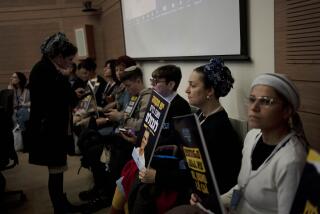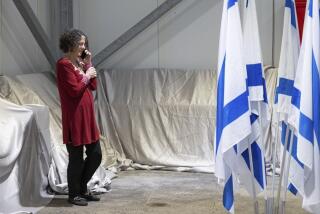During School Siege, Russia Took Captives in Chechnya
- Share via
ZNAMENSKOYE, Russia — It was 6 a.m. when Russian soldiers hoisted themselves over the wall, crashed through the window and broke down the front door. Their quarries were still asleep.
Shouting, shoving and kicking, the soldiers pushed 67-year-old Khavazh Semiyev and his wife into a truck waiting outside, then went back for the others -- his two sons and two nephews, his son’s wife, his 52-year-old sister. Then -- and Semiyev couldn’t believe his eyes -- they went back for his grandchildren: Mansur, 11 years old. Malkhazni, 9. And Mamed, 7.
They were driven in their nightclothes and socks through the empty early morning streets of Chechnya to the Russian army’s command center at Khankala. There, the men were forced onto their knees with their heads on the ground. Sacks were pulled over their heads, and their hands were tied behind their backs. For the next 24 hours, anyone who moved from that position got kicked.
One day into the seizure of more than 1,000 hostages by suspected Chechen separatists in the town of Beslan, Russia now had its own hostages. Altogether, an estimated 40 family members of senior Chechen rebel leaders were assembled at Khankala from Thursday, a day after the hostage seizure in Beslan, until Saturday, the day after it ended.
Semiyev’s daughter, Kusama, is the wife of Chechen separatist leader Aslan Maskhadov. Around Semiyev were suddenly assembled the entire extended families of Maskhadov, the former Chechen president, and of Chechen warlords Shamil Basayev and Doku Umarov. Maskhadov’s brother was in the tent where the men were kept, and his elderly sister was in a nearby building with the women and children. A 5-month-old baby proved to be a distant relative of one of the rebel leaders.
“We figured they wanted to exchange us for the hostages in Beslan,” Semiyev said in an interview at his home in this small town in northern Chechnya.
“They were trying to make the people of Chechnya feel as bad as the people in Beslan,” said Liza Akhmadkhanova, a neighbor of Maskhadov’s brother, Lyoma. “They just hate Chechens. Whenever they have a chance to get back at us, they do.”
Officially, the Russian government says the seizures were meant to protect the families. A statement from operations headquarters in the northern Caucasus said Russian forces obtained intelligence that rebel leaders planned to kill several of their own relatives and then accuse Russian law enforcement bodies of murdering them.
The headquarters staff also said there was evidence that “spontaneous groups” were being formed in various areas of Chechnya to “vent their anger” at relatives of the rebel leaders, presumably over the events in Beslan.
“There was a colonel who spoke very eloquently, and everybody was afraid of him. He said we should thank fate and God for them having taken us away on time because Maskhadov and Basayev supposedly issued an order to have us taken into the building [at Beslan] and executed with the hostages,” Semiyev said.
The family laughs wryly at this. “If this was what he thought, he must be a total imbecile,” said Aslanbek Semiyev, Khavazh’s nephew, who was one of the detainees.
Maskhadov’s spokesman in London, Akhmed Zakayev, said Russian authorities were trying to inspire terror in the terrorists -- though Maskhadov had vigorously denied involvement and condemned the hostage-taking.
“They were following the standard practice developed almost a century ago by the Bolsheviks and carried on by Stalin, who believed that every single act of terror should be responded to by an even bigger, more horrendous, more terrifying terrorist act,” Zakayev said. “According to this practice, it is necessary to shock terrorists, and let them know that under no condition will you agree to negotiate with them.”
Maskhadov’s family members said they met many members of Basayev’s family for the first time. “There was a big elderly man I was talking to there,” Semiyev said. “We were trying to track down his relationship to Basayev. It turned out Basayev’s aunt was married to him or something. We got lost in the family tree. But it was interesting after all this time to get to know them. We even hugged each other when we left.”
Across Chechnya, the reaction to the events in Beslan, where 335 hostages were killed and 700 injured, has been mixed. There has been pain on behalf of the victims, most of whom were children, and quiet resentment that the victims of Chechnya’s two wars in 10 years with Russia have fewer mourners.
“Of course we feel sorry for the hostages in Beslan, but this is a situation that happens in Chechnya every day,” said Buchu Abdul-Kadyrova, Maskhadov’s sister, who was one of those detained last week.
Tabarik Gagayeva, who sells sunflower seeds in a market outside the Chechen capital, Grozny, said, “I was sitting watching it on TV, and I was going out of my mind. I was thinking, what kind of people could do that? What kind of people could treat children like that?”
Gagayeva’s husband disappeared in 1995, though his car was discovered demolished in an area where there had been a Russian military operation. Her two brothers and one brother’s sister-in-law died the same year after troops in a Russian armored vehicle pulled over and asked about her brother’s arm wound, which he had sustained from shrapnel during a bombing.
“They said, ‘Oh, you must be a fighter, because you’re wounded,’ ” witnesses to the arrest told her. After that, she said, “they killed them. They tortured them first. They cut off their legs at the knee and their arms. The girl they literally ripped from throat to bottom.
“So you can see that when I’m watching what happened in Beslan on TV, I remember what great pain happened in my own family. I remember this with great trepidation, and I cry.”
“It was a wrong thing to do. We don’t approve of this at all,” said Islam Islamov, a 27-year-old resident of the Chechen town of Turbino. “The hostage-takers were talking about withdrawing Russian troops from Chechnya, but I don’t think it would be a good idea at all to withdraw the troops. If that happens, this [republic’s] really going to be a mess.”
But the arrest of the rebel leaders’ families also drew a negative reaction, especially since at least two family members suffered broken bones and several others severe bruises from being beaten and kicked.
“They just nabbed some elderly grannies. What did they have to do with either the field commanders here or the hostages in Beslan?” Magomed Akhmadov, 27, said. “I think they did it out of hatred. I think they wanted to demonstrate that they were strong.”
Abdul-Kadyrova, 67, said Russian interrogators roughly asked her about her contacts with her brother, with whom she said she had not spoken since he was ousted from the presidency in 1999 and disappeared into the mountains to lead the rebels.
“There were people making very frightening comments about us [the family detainees] like, ‘They should be turned into ashtrays.’ I don’t know what turning a person into an ashtray means, but it sounds very menacing,” Abdul-Kadyrova said.
“Whenever there’s a terrorist act, they say, ‘Oh, there’s Maskhadov’s hand in this, there’s a Chechen trail in it.’ They know these lines so well they could recite them if you woke them up in the middle of the night,” she said.
Most of the detainees said the Russians were seeking information about the possible perpetrators of the Beslan hostage-taking, but all said it was also clear that the arrests were a message to the rebel commanders: We know where your families are.
“There were people there 4 years old, babies, toddlers -- they simply wanted to keep us prisoners,” Abdul-Kadyrova said. “People were saying, ‘Remember how [Russian President Vladimir V.] Putin gassed his own people in Moscow [during the rescue of hundreds of hostages at the Dubrovka Theater in 2002], that’s what they’re going to do to us now.’
“People were afraid. You know, the Russians can do anything.”
Abdul-Kadyrova said she was sure her brother would never have ordered the seizure of children as hostages.
At the same time, she said, she was sure that imprisoning his family would not affect his decisions on behalf of the separatist movement.
“My brother is fighting for Chechnya’s independence. He wants the Chechen people to be free, he doesn’t want them to be subordinate to Russia,” she said. “My brother will never give up his cause, and if he does, he cannot be considered a man anymore....
“My brother would rather kill all of us than give us over to the Russians.”
More to Read
Sign up for Essential California
The most important California stories and recommendations in your inbox every morning.
You may occasionally receive promotional content from the Los Angeles Times.










